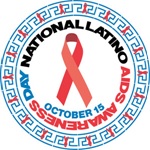Oct
14

Posted by Emily Glenn on October 14th, 2014
Posted in: Public Health
 October 15 is National Latino AIDS Awareness Day. This year’s theme is ‘To End AIDS, Commit to Act‘ – ‘Para Acabar con el SIDA, Comprometete a Actuar.‘
October 15 is National Latino AIDS Awareness Day. This year’s theme is ‘To End AIDS, Commit to Act‘ – ‘Para Acabar con el SIDA, Comprometete a Actuar.‘
Established in 2003, the National Latino AIDS Awareness Day campaign works annually at building capacity for non-profit organizations and health departments in order to reach Latino communities, promote HIV testing, and provide HIV prevention information and access to care. The Latino Commission on AIDS (LCOA), the Hispanic Federation and many other organizations organize this day.
The National HIV/AIDS Strategy, which now guides all federal HIV/AIDS-related efforts and programs, recognizes the disproportionate impact of HIV on Hispanics/Latinos communities. Although Hispanics/Latinos represent about 16% of the US population, they account for an estimated 21% of new infections each year. In 2010, the estimated rate of new HIV infection among Hispanics/Latinos in the US was more than three times as high as that of whites.
According to the Centers for Disease Control, a number of factors contribute to the HIV epidemic in Hispanic/Latino communities. These include greater overall number of people with HIV, high rates for other STDs, complex socioeconomic factors, and fear of discrimination or legal action. To build support and encourage action around these issues, the CDC offers several campaigns that encourage Latinos to talk openly about HIV/AIDS with their families, friends, partners and communities.
If you provide resources for Hispanic/Latino populations in your community, consider adding these to your toolbox: Resources for Your Health: Get Connected! Latino Health! From NN/LM, Hispanic American Health on Medline Plus, Spanish language resources from Federal agencies from AIDS.gov, and the Spanish-language AIDS information site, Infosida, which combines information derived from several authoritative resources. Learn more about health disparities at the National Center on Minority Health and Health Disparities site.